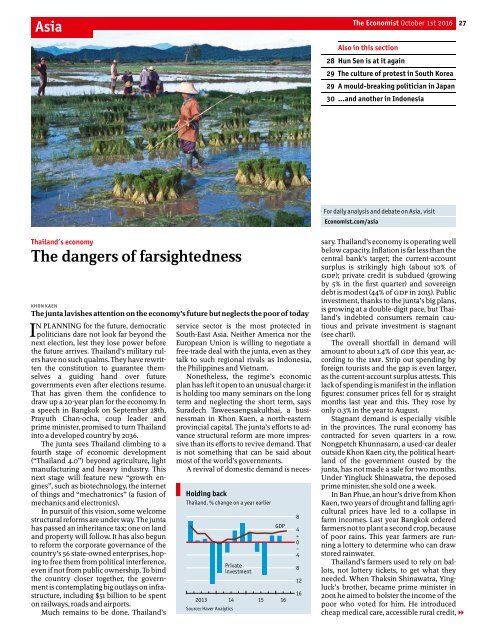You also want an ePaper? Increase the reach of your titles
YUMPU automatically turns print PDFs into web optimized ePapers that Google loves.
Asia<br />
<strong>The</strong> <strong>Economist</strong> October 1st 2016 27<br />
Also in this section<br />
28 Hun Sen is at it again<br />
29 <strong>The</strong> culture of protest in South Korea<br />
29 A mould-breaking politician in Japan<br />
30 …and another in Indonesia<br />
For daily analysis and debate on Asia, visit<br />
<strong>Economist</strong>.com/asia<br />
Thailand’s economy<br />
<strong>The</strong> dangers of farsightedness<br />
KHON KAEN<br />
<strong>The</strong> junta lavishes attention on the economy’s future but neglects the pooroftoday<br />
IN PLANNING for the future, democratic<br />
politicians dare not look far beyond the<br />
next election, lest they lose power before<br />
the future arrives. Thailand’s military rulershave<br />
no such qualms. <strong>The</strong>yhave rewritten<br />
the constitution to guarantee themselves<br />
a guiding hand over future<br />
governments even after elections resume.<br />
That has given them the confidence to<br />
draw up a 20-year plan for the economy. In<br />
a speech in Bangkok on September 28th,<br />
Prayuth Chan-ocha, coup leader and<br />
prime minister, promised to turn Thailand<br />
into a developed country by 2036.<br />
<strong>The</strong> junta sees Thailand climbing to a<br />
fourth stage of economic development<br />
(“Thailand 4.0”) beyond agriculture, light<br />
manufacturing and heavy industry. This<br />
next stage will feature new “growth engines”,<br />
such as biotechnology, the internet<br />
of things and “mechatronics” (a fusion of<br />
mechanics and electronics).<br />
In pursuit ofthis vision, some welcome<br />
structural reformsare underway. <strong>The</strong> junta<br />
has passed an inheritance tax; one on land<br />
and property will follow. It has also begun<br />
to reform the corporate governance of the<br />
country’s 56 state-owned enterprises, hoping<br />
to free them from political interference,<br />
even ifnot from public ownership. To bind<br />
the country closer together, the government<br />
is contemplating big outlays on infrastructure,<br />
including $51 billion to be spent<br />
on railways, roads and airports.<br />
Much remains to be done. Thailand’s<br />
service sector is the most protected in<br />
South-East Asia. Neither America nor the<br />
European Union is willing to negotiate a<br />
free-trade deal with the junta, even as they<br />
talk to such regional rivals as Indonesia,<br />
the Philippines and Vietnam.<br />
Nonetheless, the regime’s economic<br />
plan has left it open to an unusual charge: it<br />
is holding too many seminars on the long<br />
term and neglecting the short term, says<br />
Suradech Taweesaengsakulthai, a businessman<br />
in Khon Kaen, a north-eastern<br />
provincial capital. <strong>The</strong> junta’s efforts to advance<br />
structural reform are more impressive<br />
than its efforts to revive demand. That<br />
is not something that can be said about<br />
most ofthe world’s governments.<br />
A revival of domestic demand is neces-<br />
Holding back<br />
Thailand, % change on a year earlier<br />
2013 14 15 16<br />
Source: Haver Analytics<br />
Private<br />
investment<br />
GDP<br />
8<br />
4<br />
+<br />
0<br />
–<br />
4<br />
8<br />
12<br />
16<br />
sary. Thailand’s economy is operating well<br />
below capacity. Inflation is far less than the<br />
central bank’s target; the current-account<br />
surplus is strikingly high (about 10% of<br />
GDP); private credit is subdued (growing<br />
by 5% in the first quarter) and sovereign<br />
debt is modest (44% of GDP in 2015). Public<br />
investment, thanks to the junta’s big plans,<br />
is growing at a double-digit pace, but Thailand’s<br />
indebted consumers remain cautious<br />
and private investment is stagnant<br />
(see chart).<br />
<strong>The</strong> overall shortfall in demand will<br />
amount to about 1.4% of GDP this year, according<br />
to the IMF. Strip out spending by<br />
foreign tourists and the gap is even larger,<br />
as the current-account surplus attests. This<br />
lackofspending is manifest in the inflation<br />
figures: consumer prices fell for 15 straight<br />
months last year and this. <strong>The</strong>y rose by<br />
only 0.3% in the year to August.<br />
Stagnant demand is especially visible<br />
in the provinces. <strong>The</strong> rural economy has<br />
contracted for seven quarters in a row.<br />
Nongpetch Khunnasarn, a used-car dealer<br />
outside Khon Kaen city, the political heartland<br />
of the government ousted by the<br />
junta, has not made a sale for two months.<br />
Under Yingluck Shinawatra, the deposed<br />
prime minister, she sold one a week.<br />
In Ban Phue, an hour’s drive from Khon<br />
Kaen, two years ofdrought and falling agricultural<br />
prices have led to a collapse in<br />
farm incomes. Last year Bangkok ordered<br />
farmers not to plant a second crop, because<br />
of poor rains. This year farmers are running<br />
a lottery to determine who can draw<br />
stored rainwater.<br />
Thailand’s farmers used to rely on ballots,<br />
not lottery tickets, to get what they<br />
needed. When Thaksin Shinawatra, Yingluck’s<br />
brother, became prime minister in<br />
2001 he aimed to bolster the income of the<br />
poor who voted for him. He introduced<br />
cheap medical care, accessible rural credit, 1


